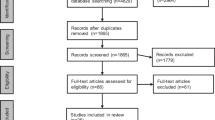Abstract
Different standards and levels of evidence for evaluating the effectiveness of psychological interventions for managing distress in cancer patients are presented and discussed. We conclude that the strongest evidence comes from systematic qualitative and quantitative (i.e., meta-analyses) reviews of the relevant literature and that the most appropriate standard of evidence is the “preponderance of evidence” rather than “beyond a reasonable doubt.” Results of four selected qualitative and quantitative systematic reviews of the literature are described. The preponderance of evidence furnished by these systematic reviews, particularly that gleaned from meta-analyses, suggests that psychological interventions are effective in managing distress in cancer patients. Although effectiveness may vary as a function of the specific nature of the intervention, overall, effectiveness appears strongest for anxiety-related outcomes and when participants are prescreened for distress. Different standards and indexes for evaluating evidence regarding the acceptability of psychological interventions with cancer patients are presented and discussed. The use of simple study accrual rates as an index of intervention acceptability is deemed inappropriate. We suggest alternative indexes of acceptability and conclude that sufficient information does not exist at the present time to draw the conclusion that contemporary psychological interventions for managing distress in cancer patients are unacceptable.
Similar content being viewed by others
References
Coyne JC, Lepore SJ, Palmer SC: Efficacy of psychosocial interventions in cancer care: Evidence is weaker than it first looks.Annals of Behavioral Medicine. 2006,32:104–110. [this issue]
Lepore SJ, Coyne JC: Psychological interventions for distress in cancer patients: A review of reviews.Annals of Behavioral Medicine. 2006,32:85–92. [this issue]
Manne SL, Andrykowski MA: Are psychological interventions effective and accepted by cancer patients? II. Using empirically-supported therapy guidelines to decide.Annals of Behavioral Medicine. 2006,32:98–103. [this issue]
Ropka ME, Spencer-Cisek P: PRISM: Priority Symptom Management Project Phase I: Assessment.Oncology Nursing Forum. 2001,28:1585–1594.
Cook DJ, Mulrow C, Haynes RB: Systematic reviews: Synthesis of best evidence for clinical decisions.Annals of Internal Medicine. 1997,126:376–380.
Barsevick AM, Sweeney C, Haney E, Chung E: A systematic qualitative analysis of psychoeducational interventions for depression in patients with cancer.Oncology Nursing Forum. 2002,29:73–84.
Newell S, Sanson-Fisher RW, Savolainen NJ: Systematic review of psychological therapies for cancer patients: Overview and recommendations for future research.Journal of the National Cancer Institute. 2002,94:558–584.
Olkin I: Statistical and theoretical considerations in meta-analysis.Journal of Clinical Epidemiology. 1995,48:133–146.
Cohen J: A power primer.Psychological Bulletin. 1992,112:155–159.
Hays RD, Wooley JM: The concept of clinically meaningful differences in health-related quality of life research: How meaningful is it?Pharmacoeconomics. 2000,18:419–423.
Norman GR, Sloan JA, Wyrwich KW: Interpretation of changes in health-related quality of life: The remarkable universality of half a standard deviation.Medical Care. 2003,41:582–592.
Devine EC, Westlake SK: The effects of psychoeducational care provided to adults with cancer: Meta-analysis of 116 studies.Oncology Nursing Forum. 1995,22:1369–1381.
Sheard T, McGuire P: The effect of psychological interventions on anxiety and depression in cancer patients: Results of two meta-analyses.British Journal of Cancer. 1999,80:1770–1780.
Ellis PM: Attitudes toward and participation in randomized clinical trials in oncology: A review of the literature.Annals of Oncology. 2000,11:939–945.
Author information
Authors and Affiliations
Corresponding author
About this article
Cite this article
Andrykowski, M.A., Manne, S.L. Are psychological interventions effective and accepted by cancer patients? I. Standards and levels of evidence. ann. behav. med. 32, 93–97 (2006). https://doi.org/10.1207/s15324796abm3202_3
Issue Date:
DOI: https://doi.org/10.1207/s15324796abm3202_3




